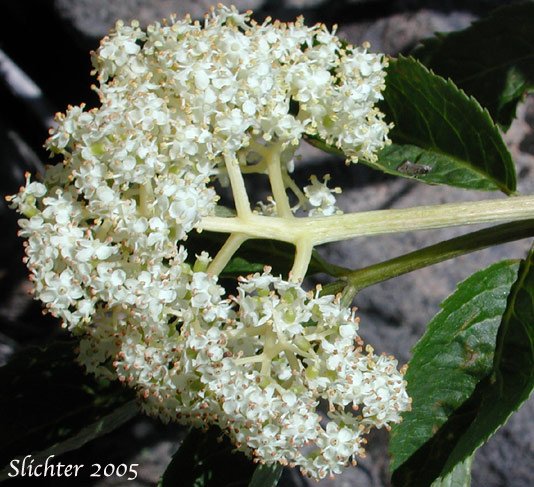 The
photo at right shows a close-up of the densely-flowered panicle of red elderberry.
The inflorescence of red elderberry tends to be more narrow or conical in shape
than the broad, flat-topped inflorescence of blue elderberry.
The
photo at right shows a close-up of the densely-flowered panicle of red elderberry.
The inflorescence of red elderberry tends to be more narrow or conical in shape
than the broad, flat-topped inflorescence of blue elderberry.
Red elderberry is a tall shrub to small tree with one (rarely) to several stems arising from the base to 2-6 meters in height. The stems are soft, glaucous and hollow, with the interior hollow space often filled with a light pith like stryofoam. The leaves are pinnately compound with 5-7 lanceolate, elliptic or lance-ovate leaflets which taper to a point (See the leaf photos below.). The margins are sharply toothed and the base of each leaflet is often unequally shaped. Individual leaflets range from 5-15 cm long and 2-6 cm wide.
The inflorescence is a panicle of many tiny white flowers. This cone-shaped cluster ranges from 4-10 cm long. Individual flowers measure 3-6 mm across and have 5 petals. The fruits are reddish and are not covered with a waxy bloom. The fruits are globose in shape and measure 5-6 mm in diameter.
Elderberry contains hydrocyanic acid which can lead to mild cyanide poisoning if consumed in large quantities. The leaves and bark contain the highest concentration of this chemical and should not be ingested. The berries of red elderberry contain high amounts of this acid and are not safe for human consumption. The various species of elderberry are all suitable as large shrubs for native woodland or riparian plantings. The berries are consumed by many birds and small mammals and the twigs and leaves are consumed by large herbivores.
Note: I've seen some references say that the berries are safe for human consumption. I've seen an equal number of books say that they are definitely not safe. I would err on the side of safety and never consume the berries of red elderberry!
Black Elderberry: Sambucus racemosa var. melanocarpa - Fruits black or purplish-black. Found east of the Cascades and common on the east side of Mt. Adams, so it might be expected at higher elevations in the eastern Columbia River Gorge and perhaps down the Klickitat River.
Red elderberry may be found in open woods and valley bottoms next to streams or where the ground is moist and / or disturbed.
Red elderberry (var, arborescens) may be found from coastal Alaska and the Aleutian Islands south through western British Columbia to San Francisco Bay in California. It is largely found between the Cascade summit and the coast range.
In the Columbia River Gorge it may be found between the elevations of 100'-4000' between the Sandy River in the west and the Little White Salmon River in the east.